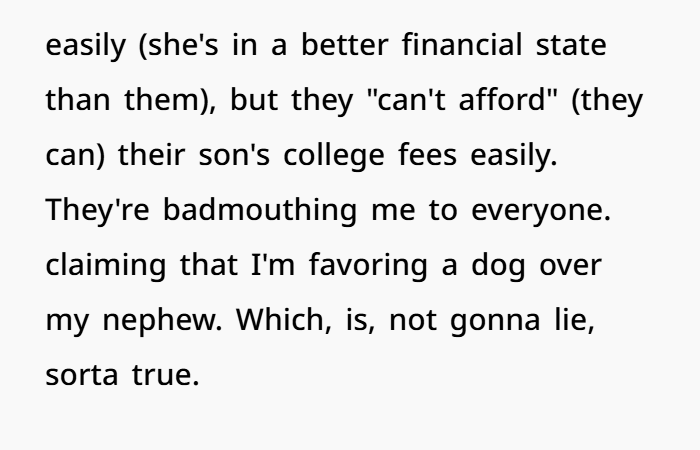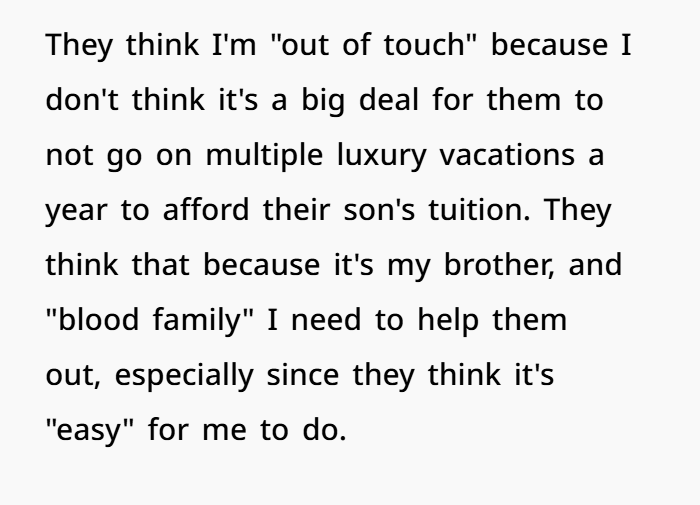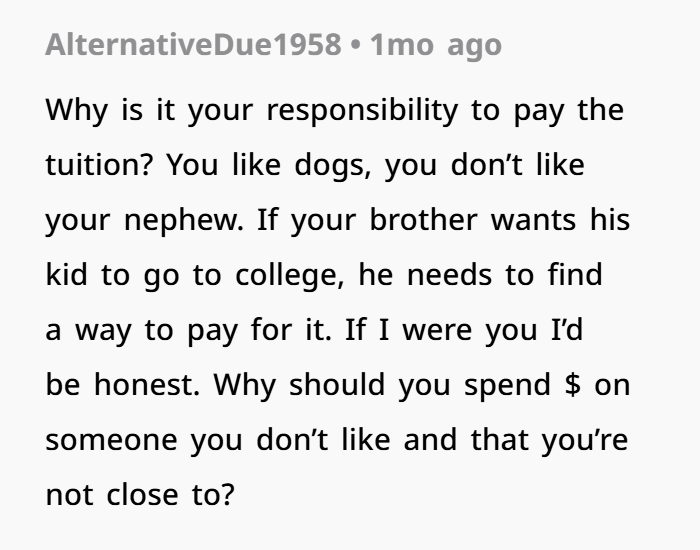Choosing Loyalty: Paying for a Dog’s Surgery Over a Nephew’s College Fund – A Harsh Reality or Fair Choice?
In a story stirring intense family drama, a financially comfortable individual opts to cover their cousin’s dog’s expensive medical treatment, while flat-out refusing to contribute to their nephew’s college tuition. This controversial choice isn’t rooted in financial hardship—rather, it’s an intentional act based on personal values and strained familial ties. The situation erupts into accusations, guilt-tripping, and social backbiting, especially from the brother and sister-in-law who believe “blood family” should come first, particularly when the financial support would come easily.
However, when lifestyle choices like frequent luxury vacations and designer shopping sprees take precedence over building a college fund, the ethical terrain gets murky. While one side frames this decision as cold and disconnected—choosing an animal over education—the other side sees it as a necessary boundary in a world where emotional and financial labor is expected, but rarely reciprocated.
When your generosity becomes expected, not appreciated, it’s time to close the wallet

One woman covered her cousin’s beloved dog’s medical bills but refused to pay for her nephew’s college tuition, as his parents can afford it







In navigating the complex terrain of familial obligations and personal choices, the situation you’ve described brings to light several pivotal considerations. Your decision to fund your cousin’s dog’s medical expenses while declining to contribute to your nephew’s college tuition underscores the intricate dynamics of family relationships, financial responsibilities, and personal values.

Legal Obligations and Educational Expenses
From a legal standpoint, individuals are generally not obligated to finance the education of extended family members, such as nephews or nieces. In many jurisdictions, even parents are not legally required to cover their children’s college expenses unless stipulated by prior agreements or court orders. For instance, in California, there is no law mandating divorced parents to pay for their child’s college tuition
Similarly, in South Carolina, parents are not legally required to pay for their children’s college tuition after a divorce
Therefore, your choice to refrain from funding your nephew’s education is within your legal rights and aligns with common legal standards regarding familial financial responsibilities.
Financial Priorities and Lifestyle Choices
Your brother and his wife’s financial habits, characterized by frequent overseas trips and luxury shopping sprees, suggest that they possess the means to fund their son’s education. However, their preference to maintain a certain lifestyle rather than allocate funds toward their child’s tuition reflects a prioritization that may not align with everyone’s values. It’s not uncommon for families to make lifestyle adjustments to accommodate significant expenses like college tuition. Many parents forego luxuries to invest in their children’s futures, viewing such sacrifices as part of their parental responsibilities. In this context, your expectation that they could similarly adjust their spending habits to support their son’s education appears reasonable.
Ethical Considerations: Pets as Family Members
The ethical debate surrounding the treatment of pets as family members is multifaceted. Many individuals consider their pets integral parts of their family, deserving of care and financial support akin to that provided to human relatives. This perspective is supported by various studies indicating that pets offer emotional support, companionship, and even health benefits to their owners . Conversely, some argue that while pets should be treated with compassion, equating them entirely to human family members may not be appropriate . In your case, your deep bond with your cousin’s dog and your willingness to fund its medical expenses highlight the subjective nature of familial bonds and the personal values that guide financial decisions.
Family Dynamics and Personal Relationships
Your described indifference toward your brother and his wife, coupled with a lack of closeness to your nephew, plays a significant role in your financial decisions. Family dynamics are complex, and emotional closeness often influences the extent to which individuals are willing to offer financial support. It’s natural for people to feel more inclined to assist those with whom they share a strong bond. Your decision reflects this common human tendency to prioritize support based on the quality of relationships rather than solely on familial ties.
Public Perception and Social Expectations

Societal norms often dictate expectations regarding family support, leading to potential judgment when actions deviate from these norms. Your family’s reaction, including accusations of favoring a pet over a family member, reflects these societal pressures. However, personal values and individual circumstances significantly influence decisions about financial support. It’s essential to recognize that societal expectations do not always align with personal ethics or the nuances of individual relationships.
Netizens side with the woman, saying what she does with her money is her business and she doesn’t owe her brother’s family anything






Your decision to fund your cousin’s dog’s medical expenses while declining to contribute to your nephew’s college tuition is a personal choice influenced by legal rights, financial priorities, ethical considerations, family dynamics, and societal expectations. While family members may have differing opinions, it’s crucial to make decisions that align with your values and the nature of your relationships. Open communication with your family about your perspectives and boundaries may help mitigate misunderstandings and foster mutual respect.

